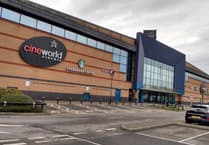FORMER Team Wales CEO Chris Jenkins has launched a bid to become the first ever Welsh head of the Commonwealth Games Federation.
The former City global investment manager moved in to sports administration some 20 years ago after moving back to live near Crickhowell.
And having led Wales to four Commonwealth Games and been elected vice-president on the global CGF, he sat down with our reporter Nick Hartland for a filmed interview to discuss his bid for the role of president, with the national associations due to vote on November 15.
The duo were rowing team-mates in the 1986 Wales Commonwealth Games team in Edinburgh – when Chris first attended the Games – and chatted at Monmouth Rowing Club where both used to train together.
And with an experience of the global event now spanning 37 years, he is standing for the top job, with a vision of securing its future and expanding its reach.
“It’s come a long way since 1986,” says Chris. “It’s much more of an event, it’s moved away from just being a sports event, it’s become a movement. I think that’s what really excites me now, not just looking back over recent years, but also looking forward.
“You’ve got this fantastic cultural diversity... from some very small countries, just a few thousand, all the way up to the largest countries in the world, with India. A huge range of peoples, experiences, cultures, languages, all coming together, a family reunited.”
The event faces challenges in a fast-changing world, he admits, with work ongoing to find a host city for the 2026 Games.
But Chris – who has just submitted a PhD thesis after five years of research into how to make the CG more sustainable, and lectures on business at the University of South Wales – believes he can drive the event forward, making the event more financially viable and inclusive.
The ‘fantastic inclusivity’ of including Para events in an integrated Games has changed the sporting landscape for the better, he says, while initiatives to support emerging athletes and coaches are creating inclusive sport pathways and bringing positive social change in sports and communities.
Adding that they need to get even more people involved, Chris says: “We have run initiatives, such as GAPS (Gather Adjust Prepare Sustain) which has really helped bring athletes on who have probably been ignored within their own community...
“It also helps us find host cities – it excites governments because you have an initiative around it that breaks down barriers.”
And he tells the inspiring story of the first ever Vanuatu athlete to win a Games medal in 2018 in Australia, whose breakthrough Para sport moment inspired a mum back home to take her disabled daughter to her local school and ask: “Does this mean I can now send my child to school?”
“That is why we do it,” says Chris. “It breaks down barriers, changes perceptions and that is the real power of Commonwealth sport.”
But the Games must become “much more sustainable”, he adds.
“We need to change the model. So it’s not just about bringing down the cost or the scale of the Games and using existing facilities, it’s the other side of the equation... which is where the host, the host communities and the governments that support them get what they want, get their value,” he adds.
“I will make sure that we move to a sustainable model... (and) I will understand what every CGA (Commonwealth Games Association) can offer. I also want to make sure that we have a different financial model for the CGF (Commonwealth Games Federation).
“From my business experience, I can tell you that we are far too reliant on just host city fees. We need to diversify our income streams, we need to bring in more partners.
“That would allow us to strengthen the programmes we do, but also continue to support CGAs, to help their development, because I know from talking to many small and mid-sized CGAs, they desperately need our help.”
He pledges to bring “really confident strong leadership” to the role, saying: “I have spent many years talking with our members understanding their issues, their challenges, and their aspirations, from the very small – just a few thousand people isolated on an island – to the largest, so I understand where they are coming from and I engage with them.“
And if elected, he hopes that people will look back in four years’ time and feel that "everyone’s voices were heard, everybody felt they participated in the movement, taking the Games forward, taking the movement forward, moving forward together”.



